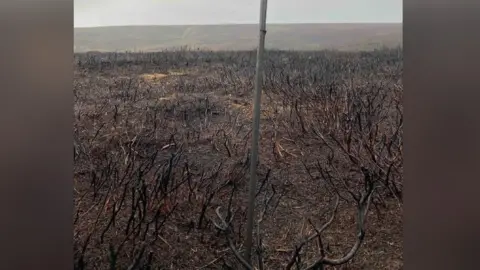Peak District landowner admits illegal peat burning on moorland
 CPS
CPSA landowner has admitted illegally burning peat on Peak District moorland.
Dunlin Ltd, which owns the grouse-shooting estate Midhope Moor, was fined £2,645 by magistrates in Sheffield after admitting six charges.
The case was the first to be brought by the Crown Prosecution Service (CPS) under new laws introduced in 2021.
An RSPB conservation officer reported the burning, carried out between 16 and 19 October, to the Department for Environment, Food and Rural Affairs.
Investigators then found 30 burns across 46.06 hectares on a hillside within a site of special scientific interest near Stocksbridge. All 15 samples taken were found deeper than 40cm.
Under the 2021 regulations, burning peat at this depth in protected areas is illegal without a licence.
Senior crown prosecutor Maqsood Khan, of the CPS's rural crime unit, said Dunlin Ltd had been "reckless" and "damaged an area of land that is already at risk".
He added: "Land agents acting for them made an application to legally burn areas of vegetation so they were clearly aware that they needed one. When the licence was refused, they simply went ahead and did it anyway."
Dunlin Ltd, a property company worth nearly £20m based in Towcester, Northamptonshire, pleaded guilty to six counts of burning peat without a licence on Wednesday. As well as the fine, the firm was ordered to pay costs of £125 and a surcharge of £720.
Dr Pat Thompson, senior policy officer for RSPB England, said: "This case demonstrates that despite assurances from some in the shooting community, illegal burning is still happening in some of our most highly protected areas.
"We know that many driven grouse moor managers are following the new rules. However, if we are to restore our upland peatlands, we need to see all land managers comply."
Burning of heather on peatland is a common practice among driven-grouse moor gamekeepers as a way to encourage new heather shoots for red grouse to feed on before they are shot for sport.
'Misunderstood regulations'
The ban on burning below 40cm was introduced to protect important carbon sinks, with England's upland peatlands estimated to contain more than 138 megatonnes of carbon.
Peatland is also an important habitat for many species, including the rare hen harrier, which uses moors for hunting and nesting.
A spokesperson for Dunlin Ltd said: "The estate management deeply regrets this contravention of burning regulations.
"We take our land management responsibilities very seriously and burning consents had been granted to us previously for the land in question.
"We genuinely misunderstood the updated regulations and this led to these errors. We have already implemented measures to ensure such an error will not happen again."

Follow BBC Yorkshire on Facebook, Twitter and Instagram. Send your story ideas to [email protected].
